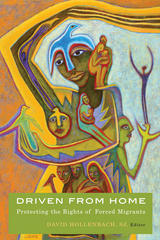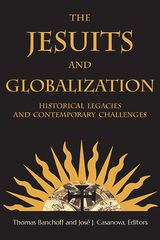
Throughout human history people have been driven from their homes by wars, unjust treatment, earthquakes, and hurricanes. The reality of forced migration is not new, nor is awareness of the suffering of the displaced a recent discovery. The United Nations High Commissioner for Refugees estimates that at the end of 2007 there were 67 million persons in the world who had been forcibly displaced from their homes—including more than 16 million people who had to flee across an international border for fear of being persecuted due to race, religion, nationality, social group, or political opinion.
Driven from Home advances the discussion on how best to protect and assist the growing number of persons who have been forced from their homes and proposes a human rights framework to guide political and policy responses to forced migration. This thought-provoking volume brings together contributors from several disciplines, including international affairs, law, ethics, economics, and theology, to advocate for better responses to protect the global community’s most vulnerable citizens.

The Global Face of Public Faith addresses the hotly debated question of the role religion should play in politics in both the American and international contexts. It engages the fears that public religion threatens American democracy and could lead to a global clash of civilizations and new wars of religion. It analyzes how Christianity can attain common ground with other religious communities, thus becoming a force for peace and human rights. The separation of church from state need not mean the privatization of religion. Religious engagement in public life can strengthen civic life by encouraging active citizen participation that promotes both justice and peace. The question of religion and politics should thus become an argument about how faith becomes public, not whether it does. Religious communities, Christianity in particular, should be vigorous advocates of human rights, democratic governance, and economic development worldwide. In so doing, they will also become peacemakers.
David Hollenbach is a calm voice of reason in a chaotic world, with an eye that sees beyond national horizons to where human needs and human rights converge. He is convinced that religious traditions can find common ground—through the use of rights and rights language. The Global Face of Public Faith reinforces his commitment to confronting such issues as poverty and economic development, globalism, and interreligious dialogue. He focuses here on faith and the Catholic tradition in politics; the role of the church in American public life; and the wider issues of global challenges and ethics—in a search for a common set of moral standards and a international ethic through a commitment to universal human rights. While not denying the difficulties of forging such a consensus, he nonetheless sees the possibility for justice, and reasons for hope. And hope is something the world can always use.

The Society of Jesus, commonly known as the Jesuits, is the most successful and enduring global missionary enterprise in history. Founded by Ignatius Loyola in 1540, the Jesuit order has preached the Gospel, managed a vast educational network, and shaped the Catholic Church, society, and politics in all corners of the earth. Rather than offering a global history of the Jesuits or a linear narrative of globalization, Thomas Banchoff and José Casanova have assembled a multidisciplinary group of leading experts to explore what we can learn from the historical and contemporary experience of the Society of Jesus—what do the Jesuits tell us about globalization and what can globalization tell us about the Jesuits? Contributors include comparative theologian Francis X. Clooney, SJ, historian John W. O'Malley, SJ, Brazilian theologian Maria Clara Lucchetti Bingemer, and ethicist David Hollenbach, SJ. They focus on three critical themes—global mission, education, and justice—to examine the historical legacies and contemporary challenges. Their insights contribute to a more critical and reflexive understanding of both the Jesuits’ history and of our contemporary human global condition.

With an equal emphasis on every word in the title—and with a distinctly American perspective—Himes and his distinguished associate editors and contributors, have assembled the most thorough and authoritative assessment of modern Roman Catholic social teaching to date, likely to remain the touchstone volume for decades. This culmination of many years of effort by twenty stellar scholars has produced a reference work for anyone interested in understanding or studying the key documents that comprise the central corpus of Catholic social teaching.
In addition to interrogations of the major documents, this volume provides an understanding of the biblical and philosophical foundations of Catholic social teaching, addresses the doctrinal issues that arise in such a context, and explores the social thought leading up to the "modern" era, generally accepted as beginning in 1891 with the publication of Pope Leo XIII's Rerum Novarum. Finally, there is a review of how Catholic social teaching has been received in the United States, and an informed look at the shortcomings and questions that future generations must address.
By any standard, Modern Catholic Social Teaching is a remarkable work—intellectually rigorous and deeply faithful, it provides accessible and thought-provoking insights into the heart of a belief tradition that every Catholic will find invaluable.

Including contributions from twenty-two leading moral theologians, this volume is the most thorough assessment of modern Roman Catholic social teaching available. In addition to interrogations of the major documents, it provides insight into the biblical and philosophical foundations of Catholic social teaching, addresses the doctrinal issues that arise in such a context, and explores the social thought leading up to the "modern" era, which is generally accepted as beginning in 1891 with the publication of Pope Leo XIII's Rerum Novarum. The book also includes a review of how Catholic social teaching has been received in the United States and offers an informed look at the shortcomings and questions that future generations must address. This second edition includes revised and updated essays as well as two new commentaries: one on Pope Benedict XVI's encyclical Caritas in Veritate and one on Pope Francis's encyclical Laudato Si'. An outstanding reference work for anyone interested in studying and understanding the key documents that make up the central corpus of modern Catholic social teaching.

Of the over 33 million refugees and internally displaced people in the world today, a disproportionate percentage are found in Africa. Most have been driven from their homes by armed strife, displacing people into settings that fail to meet standards for even basic human dignity. Protection of the human rights of these people is highly uncertain and unpredictable. Many refugee service agencies agree advocacy on behalf of the displaced is a key aspect of their task. But those working in the field are so pressed by urgent crises that they can rarely analyze the requirements of advocacy systematically. Yet advocacy must go beyond international law to human rights as an ethical standard to prevent displaced people from falling through the cracks of our conflicted world.
Refugee Rights: Ethics, Advocacy, and Africa draws upon David Hollenbach, SJ's work as founder and director of the Center for Human Rights and International Justice at Boston College to provide an analytical framework for vigorous advocacy on behalf of refugees and internally displaced people. Representing both religious and secular perspectives, the contributors are scholars, practitioners, and refugee advocates—all of whom have spent time "on the ground" in Africa. The book begins with the poignant narrative of Abebe Feyissa, an Ethiopian refugee who has spent over fifteen years in a refugee camp from hell. Other chapters identify the social and political conditions integral to the plight of refugees and displaced persons. Topics discussed include the fundamental right to freedom of movement, gender roles and the rights of women, the effects of war, and the importance of reconstruction and reintegration following armed conflict. The book concludes with suggestions of how humanitarian groups and international organizations can help mitigate the problem of forced displacement and enforce the belief that all displaced people have the right to be treated as their human dignity demands.
Refugee Rights offers an important analytical resource for advocates and students of human rights. It will be of particular value to practitioners working in the field.
READERS
Browse our collection.
PUBLISHERS
See BiblioVault's publisher services.
STUDENT SERVICES
Files for college accessibility offices.
UChicago Accessibility Resources
home | accessibility | search | about | contact us
BiblioVault ® 2001 - 2024
The University of Chicago Press









